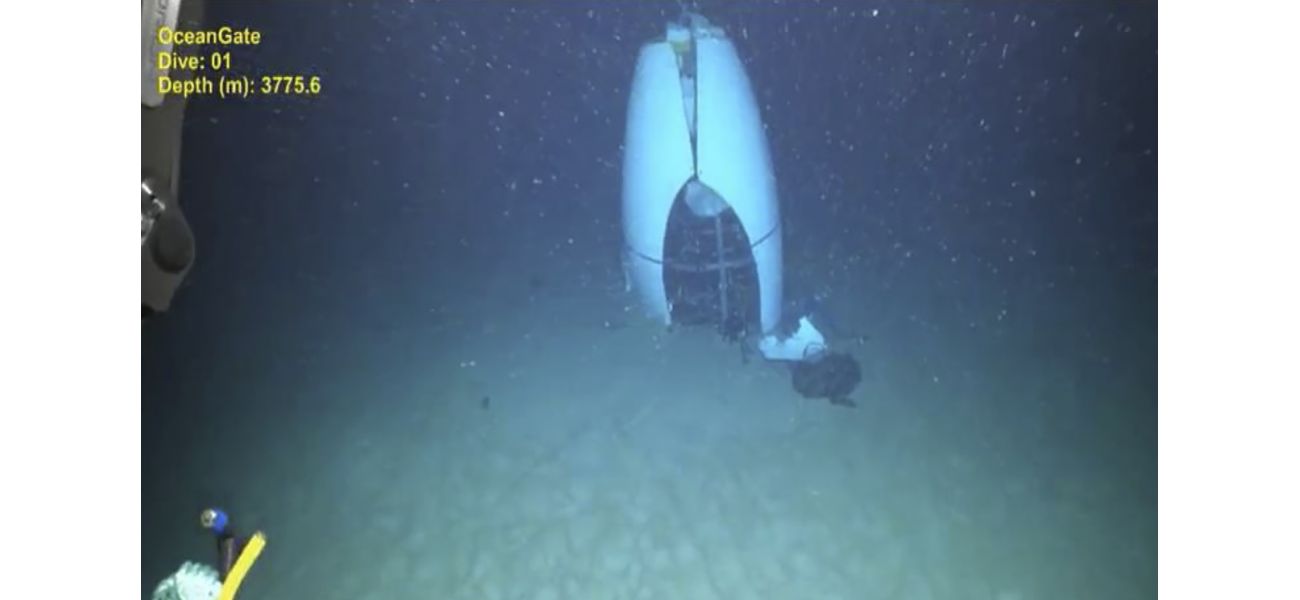Titan sub dive canceled due to malfunction, according to previous passenger.
Fred Hagen's 2021 Titanic mission was cut short due to a malfunctioning Titan, preventing them from reaching the wreck site.
September 20th 2024.

On Friday, a paid passenger who was part of an expedition to the Titanic with the company that owned the Titan submersible testified before a US Coast Guard investigatory panel. He shared that the mission had to be aborted due to a mechanical failure. Sadly, this was not the first time that the Titan had encountered such a fate. The submersible had imploded the previous year during a trip to the Titanic wreckage site.
The Coast Guard panel had been listening to four days of intense testimony, trying to understand the circumstances that led to the doomed mission. It was revealed that the company's operations had been called into question, causing concerns among those involved. Fred Hagen, the first witness to testify on Friday, was identified as a "mission specialist." This term was used to describe individuals who paid a fee to be a part of OceanGate's underwater exploration. Hagen recounted his experience on the Titanic expedition, explaining that the mission had to be aborted due to the malfunctioning of the Titan. It became clear that they would not be able to reach the fabled wreck site.
Hagen shared that the submersible seemed to be off course, so the crew decided to use thrusters to redirect it towards the Titanic. However, the starboard thruster failed to activate, making it impossible to reach their destination. "We realized that all it could do was spin around in circles, making right turns," Hagen recalled. "At that point, it was clear that we would not be able to navigate to the Titanic."
The mission had to be scrapped, and the Titan resurfaced. Hagen revealed that he was well aware of the potential dangers of getting into an experimental submersible. He shared, "Anyone who wanted to go was either delusional if they didn't think it was dangerous, or they were embracing the risk." Unfortunately, OceanGate co-founder Stockton Rush was among the five people who lost their lives in the 2023 implosion of the submersible.
The Coast Guard had opened a public hearing earlier this month to investigate the cause of the accident. The hearing, which began on September 16, has been focused on the problems that the Washington state company had been facing before the fatal dive in 2023. During Thursday's testimony, company scientific director Steven Ross revealed that the submersible had experienced a malfunction just days before the Titanic expedition.
Another witness, former OceanGate operations director David Lochridge, shared that he frequently clashed with Rush and felt that the company was only interested in making money. "The whole idea behind the company was to make money," Lochridge stated. "There was very little focus on science." The hearing is set to resume next week and continue until September 27.
On Friday, the panel heard from engineer Dave Dyer of the University of Washington Applied Physics Lab. Dyer provided details about the lab's relationship with OceanGate while the submersible was in development. He shared that the company and the lab had disagreed on fundamental aspects of engineering, leading to the termination of their relationship. "It was the engineering. We were butting heads too much," Dyer explained.
Triton Submarines chief executive officer Patrick Lahey, who met with OceanGate personnel in 2019 and had a look at their submersible during its development, shared that he was not impressed by what he saw. He stated, "I wasn't particularly impressed by it." Lahey emphasized the importance of ensuring that submersibles are accredited for safety, expressing his concerns about the readiness of the Titan. "It looked to me like a lot of the stuff was not quite ready for primetime. And that there were many things in it that I thought had not been executed as appropriately as they should be."
Lochridge and other witnesses have portrayed a picture of a company that was led by individuals who were eager to get their unconventional craft into the water. Lochridge shared that he had even filed a complaint with the federal Occupational Safety and Health Administration (OSHA) about the company. OSHA promptly referred his safety allegations to the Coast Guard, according to a spokesperson for the agency.
The fatal accident sparked a global debate about the future of private undersea exploration. The Coast Guard noted at the start of the hearing that the submersible had not been independently reviewed, which is the standard practice. This, along with the Titan's unique design, has brought it under scrutiny in the undersea exploration community. However, Renata Rojas, a mission specialist for the company, shared a different perspective with the Coast Guard. She testified that the company was made up of competent people who were determined to "make dreams come true." Her testimony had a different tone than some of the earlier witnesses.
Rojas shared, "I was learning a lot and working with amazing people. Some of those people are very hardworking individuals who were just trying to make dreams come true." After the implosion, OceanGate suspended its operations. The company currently has no full-time employees, but they have been represented by an attorney during the hearing.
During the submersible's final dive on June 18, 2023, the crew lost contact after exchanging texts about the Titan's depth and weight during its descent. The support ship Polar Prince repeatedly asked if the submersible could still see the ship on its onboard display. One of the last messages from the Titan's crew to Polar Prince before the submersible imploded stated, "all good here." However, the submersible was reported missing, and rescue efforts were quickly mobilized. The wreckage of the Titan was found four days later on the ocean floor near the Titanic, about 700 kilometers south of St. John's, Newfoundland. Sadly, no one on board survived.
OceanGate has been fully cooperating with the Coast Guard and NTSB investigations since they began. The company has been making voyages to the Titanic wreckage site since 2021.
The Coast Guard panel had been listening to four days of intense testimony, trying to understand the circumstances that led to the doomed mission. It was revealed that the company's operations had been called into question, causing concerns among those involved. Fred Hagen, the first witness to testify on Friday, was identified as a "mission specialist." This term was used to describe individuals who paid a fee to be a part of OceanGate's underwater exploration. Hagen recounted his experience on the Titanic expedition, explaining that the mission had to be aborted due to the malfunctioning of the Titan. It became clear that they would not be able to reach the fabled wreck site.
Hagen shared that the submersible seemed to be off course, so the crew decided to use thrusters to redirect it towards the Titanic. However, the starboard thruster failed to activate, making it impossible to reach their destination. "We realized that all it could do was spin around in circles, making right turns," Hagen recalled. "At that point, it was clear that we would not be able to navigate to the Titanic."
The mission had to be scrapped, and the Titan resurfaced. Hagen revealed that he was well aware of the potential dangers of getting into an experimental submersible. He shared, "Anyone who wanted to go was either delusional if they didn't think it was dangerous, or they were embracing the risk." Unfortunately, OceanGate co-founder Stockton Rush was among the five people who lost their lives in the 2023 implosion of the submersible.
The Coast Guard had opened a public hearing earlier this month to investigate the cause of the accident. The hearing, which began on September 16, has been focused on the problems that the Washington state company had been facing before the fatal dive in 2023. During Thursday's testimony, company scientific director Steven Ross revealed that the submersible had experienced a malfunction just days before the Titanic expedition.
Another witness, former OceanGate operations director David Lochridge, shared that he frequently clashed with Rush and felt that the company was only interested in making money. "The whole idea behind the company was to make money," Lochridge stated. "There was very little focus on science." The hearing is set to resume next week and continue until September 27.
On Friday, the panel heard from engineer Dave Dyer of the University of Washington Applied Physics Lab. Dyer provided details about the lab's relationship with OceanGate while the submersible was in development. He shared that the company and the lab had disagreed on fundamental aspects of engineering, leading to the termination of their relationship. "It was the engineering. We were butting heads too much," Dyer explained.
Triton Submarines chief executive officer Patrick Lahey, who met with OceanGate personnel in 2019 and had a look at their submersible during its development, shared that he was not impressed by what he saw. He stated, "I wasn't particularly impressed by it." Lahey emphasized the importance of ensuring that submersibles are accredited for safety, expressing his concerns about the readiness of the Titan. "It looked to me like a lot of the stuff was not quite ready for primetime. And that there were many things in it that I thought had not been executed as appropriately as they should be."
Lochridge and other witnesses have portrayed a picture of a company that was led by individuals who were eager to get their unconventional craft into the water. Lochridge shared that he had even filed a complaint with the federal Occupational Safety and Health Administration (OSHA) about the company. OSHA promptly referred his safety allegations to the Coast Guard, according to a spokesperson for the agency.
The fatal accident sparked a global debate about the future of private undersea exploration. The Coast Guard noted at the start of the hearing that the submersible had not been independently reviewed, which is the standard practice. This, along with the Titan's unique design, has brought it under scrutiny in the undersea exploration community. However, Renata Rojas, a mission specialist for the company, shared a different perspective with the Coast Guard. She testified that the company was made up of competent people who were determined to "make dreams come true." Her testimony had a different tone than some of the earlier witnesses.
Rojas shared, "I was learning a lot and working with amazing people. Some of those people are very hardworking individuals who were just trying to make dreams come true." After the implosion, OceanGate suspended its operations. The company currently has no full-time employees, but they have been represented by an attorney during the hearing.
During the submersible's final dive on June 18, 2023, the crew lost contact after exchanging texts about the Titan's depth and weight during its descent. The support ship Polar Prince repeatedly asked if the submersible could still see the ship on its onboard display. One of the last messages from the Titan's crew to Polar Prince before the submersible imploded stated, "all good here." However, the submersible was reported missing, and rescue efforts were quickly mobilized. The wreckage of the Titan was found four days later on the ocean floor near the Titanic, about 700 kilometers south of St. John's, Newfoundland. Sadly, no one on board survived.
OceanGate has been fully cooperating with the Coast Guard and NTSB investigations since they began. The company has been making voyages to the Titanic wreckage site since 2021.
[This article has been trending online recently and has been generated with AI. Your feed is customized.]
[Generative AI is experimental.]
0
0
Submit Comment





